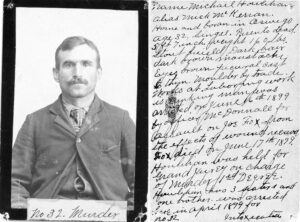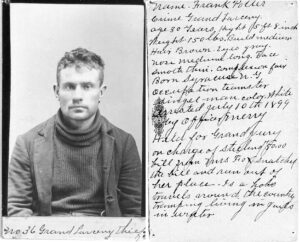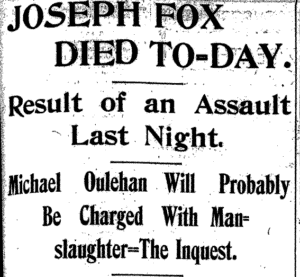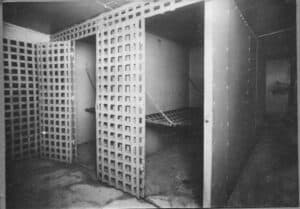A Victorian Murder Trial
By Becky Chapin, Archivist
On June 16, 1899, a tragedy occurred on Exchange Street at the Castle Garden hotel owned by Joseph and Catherine Fox. The Castle Garden was located at 306 Exchange Street, a building which no longer exists today. On that day, Michael Houlihan visited the barroom and started a fight with Thomas Smith. Mrs. Fox asked Houlihan to leave the building and the latter called her vile names.
In response, Mr. Fox came out from the back room and ordered Houlihan out, pulling him to the door. At the top step, Mr. Fox somehow fell backward and struck his head on the sidewalk, going unconscious. Mrs. Fox called for the police, believing her husband was dead, and Mr. Fox was taken up to his rooms above the bar. Officer McDonnell arrested Houlihan on the spot for first degree murder. Mr. Fox lingered until the next afternoon when he succumbed to his wounds.
I just happened upon an article about the incident while reading through newspapers and decided to investigate more. Readers of the Geneva newspapers were surely following the incident closely, just as we today take in documentary after podcast after tv show about all sorts of “true crime.”
In fact, the incident made the front page numerous times between June and November, from the early investigation through the final sentencing. Witness statements differed during the coroner’s inquest through the murder trial that followed but the story unfolded much like it would today.
Mrs. Fox described the day of June 16 to the coroner’s jury just a week after the incident. Earlier in the day, Mr. Houlihan had come in with his friend Thomas Smith. She refused to serve them because they had no money, but Smith convinced her they were to be paid at 1 pm so she poured them one beer. Mr. Fox then poured them another despite his wife’s protestations. The two left between 8 and 9 in the forenoon. Smith returned around 1 pm with the 20 cents he owed and stayed; Houlihan returned at 2 pm.

Michael Houlihan’s booking photo, his information and the description of his crime are on the reverse.
Between 3 and 4 pm, Houlihan went over to Hugh McGeary who was talking with John Cooney, McGeary told him to go away and Houlihan hit him in the side. Mrs. Fox ordered Houlihan out and he left.
Houlihan returned at 9 pm, continuing to drink with Smith when he knocked a glass out of Smith’s hand and/or hit Smith (reports are unclear). Mrs. Fox “expostulated” with Houlihan when he turned to her and spouted coarse language and vile epithets to which Mr. Fox took issue. He told Houlihan “She is my wife, and you either quit or get out,” though the man did neither. Mr. Fox took hold of him and led him to the door.
At this point, the witness statements diverge. Original reports in the paper were that Houlihan pushed Mr. Fox from the top step, Fox struck his head on the ground and went still. The responding police officers maintain that neither man hit the other, that Houlihan lifted Mr. Fox and threw him to the sidewalk. This version of events was backed up by Mrs. Fox and John Cooney. In the Geneva Advertiser, it was said Houlihan “struck him a powerful blow which sent him clear off the steps, and that he fell backward, striking the back of his head on a pile of paving stone.” This version of events is what James Rogers, who had been at the bar, testified to during the inquest and insisted on during the trial, though he is the only witness to give this version of events.
What the witnesses do agree to is that after Mrs. Fox cried “Police my husband is dead,” Houlihan said “If he isn’t, I hope to God he will die.” Mrs. Fox testifies during the trial that he also said, “I suppose they will kill me, too.”
During the coroner’s inquest, the jury would meet at the scene of the crime to go through the events, as there were still questions about how Mr. Fox obtained certain injuries on the front of his head that were found during the autopsy. It’s never clear how Mr. Fox had obtained injuries on the front of his face, it may be that James Rogers is correct and that Houlihan hit Fox, but he could have sustained them any time during the struggle.
The verdict of the coroner’s jury was “That Joseph Fox came to his death by reason of fracture of the skull, with brain lesion, received at the Castle Garden hotel, located at 306 Exchange street, in the city of Geneva, NY, on the 16 day of June 1899. The said injury was the result of violence at the hands of Michael Houlihan.”
Bail for Houlihan had been fixed at $1,500, of which he could not furnish, and he remained in a Canandaigua jail through his trial in November.

Frank Potter’s booking photo. On the reverse, he is described as a ‘hobo’, traveling around the country, tramping and living in jails.
Just days after the death of her husband, Mrs. Fox was the victim of a robbery. A man came into the bar when she was counting money, and as the newspaper puts it, he said “Is that a $50 bill?” When Mrs. Fox replied in affirmative the man said he had never seen a $50 bill before. He picked it up and Mrs. Fox remonstrated. “I merely wished to examine it,” said Potter. ‘But the words were scarcely out of his mouth when he sprang to the doors and was out on the street.’
Mrs. Fox got the police and described the man to Chief Kane and Officer Merry who searched the area. One and a half hours later, they found Frank Potter in the New York Central and Hudson Railroad yards who they say fit the description. He did not have the money on him and the police never could find the money. However, Potter was jailed and charged with petit larceny. He must have remained in jail until his trial in November when he was acquitted of the charge.
A witness was then arrested weeks before the trial. John Cooney, as mentioned above, had given his statement at the coroner’s jury about seeing the scrap between Mr. Fox and Houlihan. He also directly controverted Rogers’ statement, saying Rogers was in the back of the room and could not have seen any blow dealt by Houlihan. Between the inquest and the trial, Cooney lost his job and wanted to return home to Boston where he had one. Under the law, a witness in a murder case may be sent to jail or put under bonds in the sum of $1,000 if they want to leave.
Cooney left Geneva after being put under bond, only to fall in with some “roistering” companions in Syracuse and was committed to the Onondaga county penitentiary. Upon release in October, he returned to Geneva, only to be jailed almost immediately for intoxication. What this did to his credibility at trial is not documented.
Houlihan would give his own version of events at trial, admitting he had been at the Castle Garden hotel during the day. At some point, he saw Mrs. Fox pick up some of his money he dropped and kept it; Houlihan told her ‘good naturedly’ that he ought to have her arrested. He claimed Mr. Fox tried to throw him off the stoop but he regained his balance and Mr. Fox tried again; in the struggle Fox fell backward. He then claimed that he saw a quarrel between Mr. and Mrs. Fox, that she shoved her husband against the wall of the hotel and accused him of being a drunkard; no one else verified this statement.
The jury was out for less than two hours and returned guilty as charged with manslaughter in the second degree. Judge Knapp sentenced him to three years, 4 months in the Auburn prison.
Researching this case was interesting because Houlihan’s name was spelled at least 5 different ways and he initially gave an alias to police when he was arrested. Officer McDonnell took his name down as Mick McKenna on the back of the booking photo, an alias that newspapers said Houlihan had used when he was arrested before. Different Geneva newspapers spelled it Oulehan at first, then Hoolihan, Houlehan, Holehan, and Houlihan; one of the newspapers claimed that Houlihan was the definitive spelling, so that’s what I went with.



I enjoyed this story very much!
An interesting read! Apparently it was an Irish pub! What is at 306 Exchange St. now?
306 Exchange does not exist anymore.